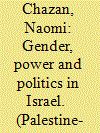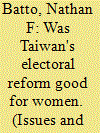|
|
|
Sort Order |
|
|
|
Items / Page
|
|
|
|
|
|
|
| Srl | Item |
| 1 |
ID:
130491


|
|
|
|
|
| Publication |
2011.
|
| Summary/Abstract |
The story of women, politics and power in Israel is fraught with anomalies. Women have traditionally been active participants in the public sphere, but their power has been consistently constrained. They have suffered from systematic underrepresentation, but as their number in the formal political arena has grown, their substantive impact has waned. And while they have scored significant achievements, gender inequality endures. Never have these inherent contradictions been more apparent than during the past decade, when the rising political clout of women has not been translated into sustained power, their increased political presence into effective influence, or their tangible legislative gains into significant socioeconomic progress. These trends highlight not only the ongoing impact of chauvinistic, militaristic and particularistic strains on Israeli politics in general and the depth of the recent move to the right in particular, but also the innovative potential of gender-rooted alternatives
|
|
|
|
|
|
|
|
|
|
|
|
|
|
|
|
| 2 |
ID:
132777


|
|
|
|
|
| Publication |
2014.
|
| Summary/Abstract |
Relative to other countries in the world, Taiwan has consistently elected large numbers of women to political office. This paper argues that women have done well in Taiwan because of the reserved female seat system in SNTV elections and that the 2005 reform from SNTV to MMM did not produce further gains in gender equality. SNTV with reserved seats produces incentives for parties to cultivate large numbers of powerful women in order to ensure that other parties are not able to win cheap or free seats. Empirically, the evidence shows that women win significantly more votes and seats in districts with reserved seats than in those without them. Moreover, winning an SNTV election requires candidates to amass power resources, and the women who survive this arduous test have power that can be used for other political goals. Women elected on party lists do not necessarily accumulate as much power. The new MMM system has arguably not produced more female legislators than the old SNTV system would have, and it has reduced the aggregate power that women in the legislature can wield.
|
|
|
|
|
|
|
|
|
|
|
|
|
|
|
|
| 3 |
ID:
082166


|
|
|
|
|
| Publication |
2008.
|
| Summary/Abstract |
This paper explores the responses of women living in a small town in the Chitral region of northern Pakistan to the Islamizing policies of the Muttahida Majlis-e Amal, a coalition of Islamist parties elected to provincial government in the North West Frontier Province in October 2002. Its focus is on women in the region who vocally and publicly criticize Chitral's politically active madrasa-educated 'men of piety'. Documenting the ways in which these women and the region's 'men of piety' debate with one another on matters concerning personal morality, comportment and self-presentation illuminates dimensions of small-town Muslim life that are rarely considered important in Pakistan's North West Frontier Province. In particular, by exploring these complex and multi-dimensional debates, I seek to emphasize the inherently unfinished nature of Chitralis' responses to ongoing Islamizing processes, a growing and pervasive sense of disenchantment amongst many of the region's Muslims with the authenticity of public expressions of personal piety, and, in this context, the continuing emergence of new ways of being Muslim, modes of self-presentation and categories of Islamic public opinion forming figures.
|
|
|
|
|
|
|
|
|
|
|
|
|
|
|
|
|
|
|
|
|